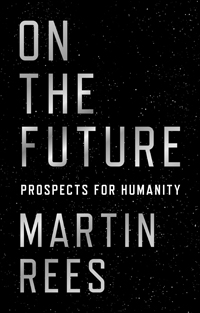 Martin Rees, On the Future: Prospects for Humanity (Princeton: Princeton University Press, 2019), 256pp.
Martin Rees, On the Future: Prospects for Humanity (Princeton: Princeton University Press, 2019), 256pp.
When the English polymath Robert Boyle died in 1691, he left a hand written note of inventions that he hoped would be created for "the relief of Man's estate." It's an interesting list to consider three hundred years after the fact. Boyle envisaged "the art of flying." He hoped for "the practicable and certain way of finding Longitudes," and for "a perpetual Light."
Futurology is risky business, as Martin Rees freely admits, and no doubt, he observes, Boyle would be astonished at the inventions of our own age, not the least of which is "the art of flying." Broadly speaking, predictions about the future tend to be either optimistic or pessimistic. The Harvard psychologist Steven Pinker belongs to the former view, as seen in his recent books The Better Angels of Our Nature (2011) and Enlightenment Now (2018). For Pinker, life is getting better for most people on earth. As it turns out, the last book I reviewed before Rees fears a climate change dystopia: The Uninhabitable Earth: Life After Warming (2019) by David Wallace-Wells, the message of which is both simple and terrifying: our climate change disaster is "worse, much worse, than you think."
Rees, Astronomer Royal and Master of Trinity College and Director of the Institute of Astronomy at Cambridge University, falls somewhere in between. On the one hand, he identifies himself as a "techno-optimist." The unifying theme of his book is that "the flourishing of the world's population depends on the wisdom with which science and technology is deployed," especially in the areas of biotech, cyber tech, robotics, and artificial intelligence. And so he discourses on things like clean energy, information technologies, gene editing, food production, and even a "diaspora" of habitats beyond our planet earth.
On the other hand, he acknowledges that we face a "dystopian downside." Technologies introduce new vulnerabilities, ethical dilemmas, and economic disruptions. A "depressing theme throughout this book," he admits, is the disconnect between his technological optimism about what is possible and his political pessimism about governments and large institutions agreeing to make wise choices on behalf of all humanity: "the challenges to governance are huge and daunting." To think rationally, globally, and collectively is easier said than done.
"We can be technological optimists," Rees says in the final pages of his book, but our future must nonetheless "be guided by values that science alone cannot provide."
Dan Clendenin: dan@journeywithjesus.net


